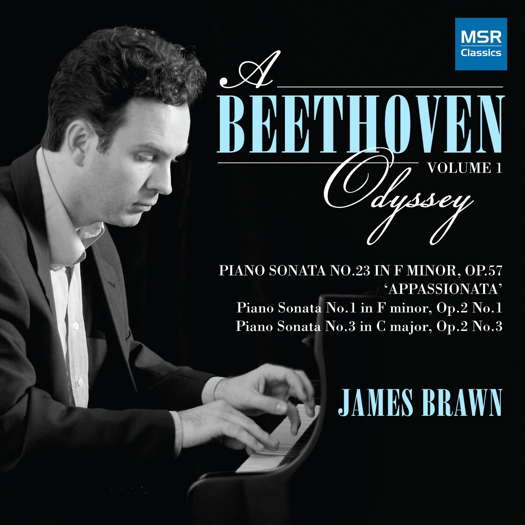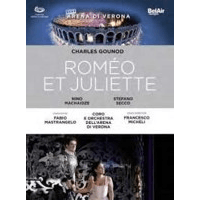 SPONSORED: DVD Spotlight. Olympic Scale - Charles Gounod's Roméo et Juliette, reviewed by Robert Anderson.
SPONSORED: DVD Spotlight. Olympic Scale - Charles Gounod's Roméo et Juliette, reviewed by Robert Anderson.
All sponsored features >>
Rollicking Comedy
MARIA NOCKIN reports from San Diego Opera's drive-in performances of Rossini's 'The Barber of Seville'
On 25 April 2021, San Diego Opera presented a drive-in performance of Rossini's The Barber of Seville that was seen on the fully equipped outdoor stage and screens erected in the parking lot of the Pechanga Arena. To comply with California COVID rules, the performance was limited to ninety minutes. There was no intermission and patrons had to watch from their cars. Food trucks were present, however, so patrons who arrived early could enjoy gourmet dinners in their cars. Unlike San Francisco Opera which discouraged honking this past week asking patrons to use light sticks instead, San Diego Opera supported the use of car horns after arias and ensembles as well as at the end of each act. It was loud and it was fun.
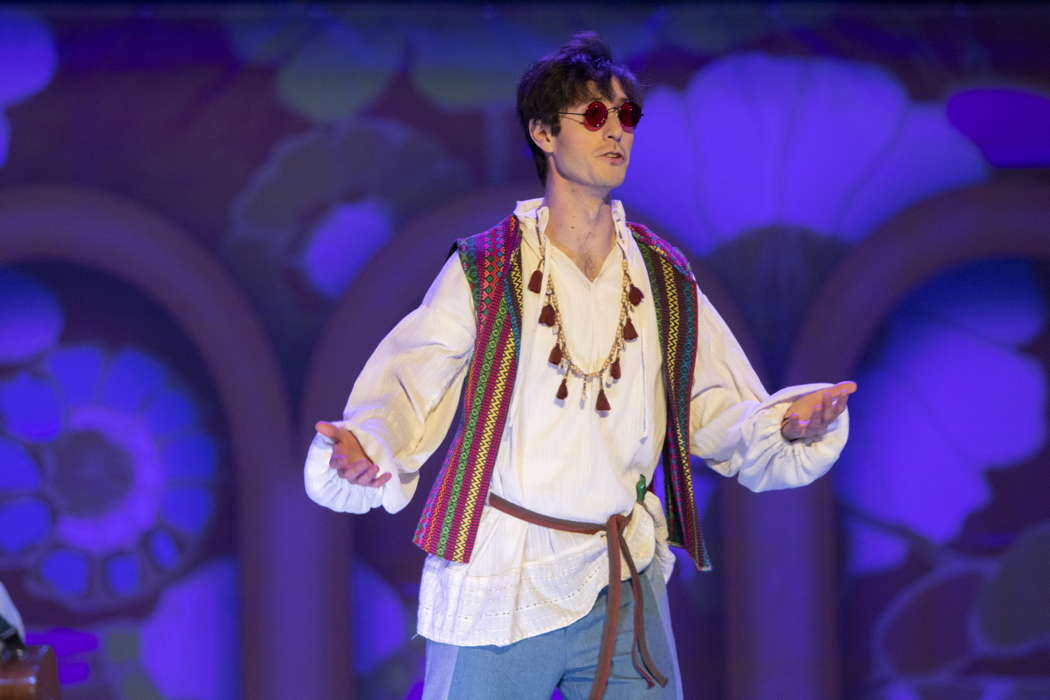
Joshua Arky as Fiorello in San Diego Opera's production of The Barber of Seville. Photo © 2021 J Kat Woronowicz
Director Keturah Stickann gave the San Diego audience as much of a traditional Barber updated to the nineteen-sixties as could be jammed into ninety minutes of rollicking comedy. She left that car-bound audience honking for more. Ingrid Helton's costumes, designed after Amanda Seymour's originals, definitely established the time period. Some of them were almost blinding in their psychedelic designs, but I remember wearing wild bell-bottoms back then. Tim Wallace's scenery was sparse but effective while Chris Rynne's well-planned lighting design kept the right aspects of the show visible at the right time.
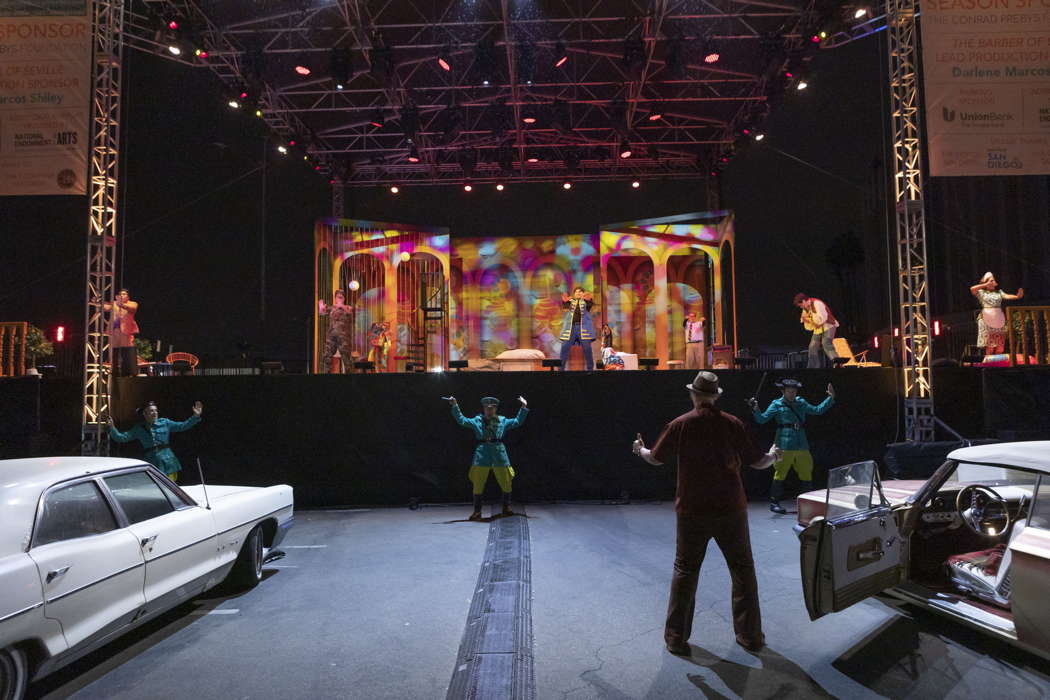
The San Diego Opera chorus in Rossini's The Barber of Seville in Pechanga Arena San Diego parking lot. Photo © 2021 J Kat Woronowicz
Almaviva, tenor Carlos Enrique Santelli, opened the show with his early morning serenade for Rosina, Emily Fons, who was pulled away from her window by an unseen hand.
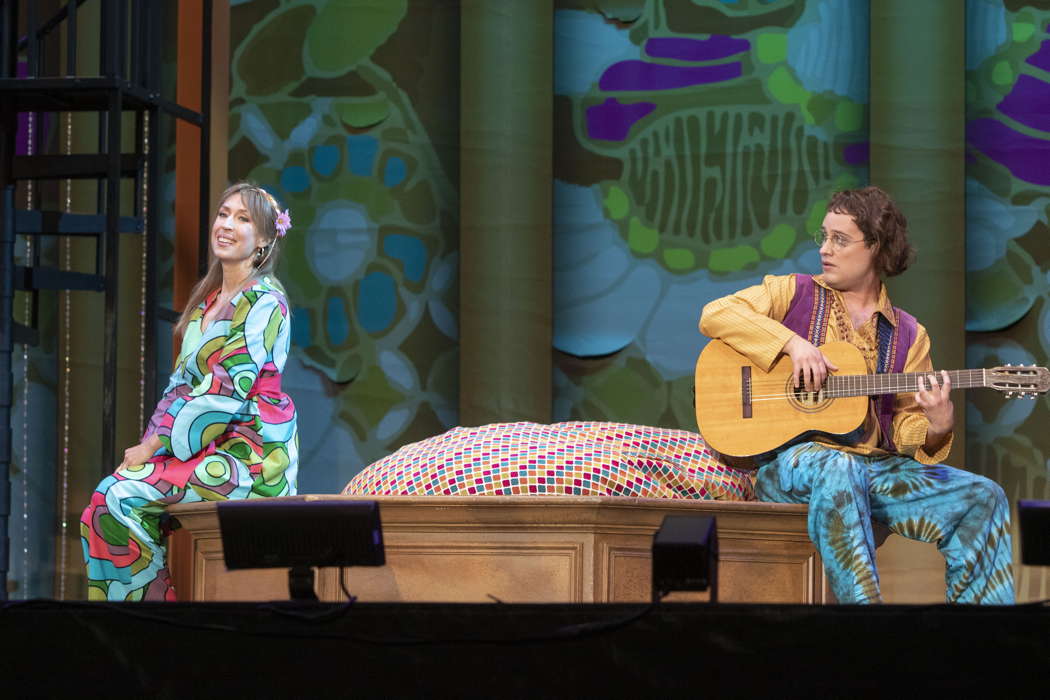
Emily Fons as Rosina and Carlos Enrique Santelli as Count Almaviva in the San Diego Barber of Seville. Photo © 2021 J Kat Woronowicz
As Figaro, the all around Mr Fixit, David Pershall showed his ability as a factotum and promised to help Almaviva in dealing with Rosina's guardian, Dr Bartolo.
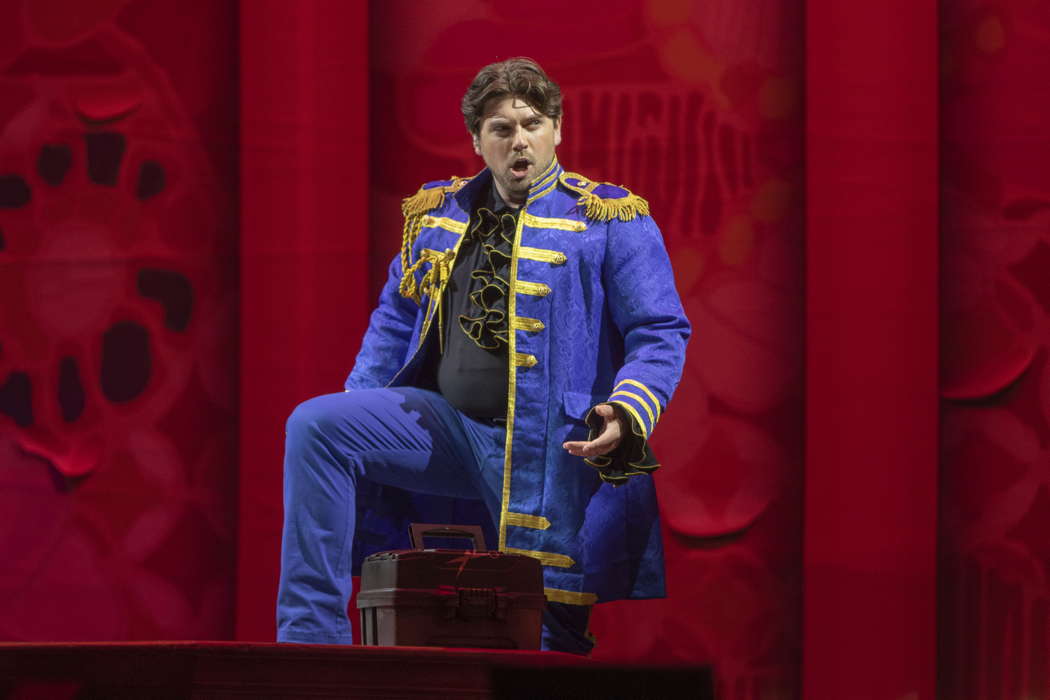
David Pershall as Figaro in Rossini's Barber. Photo © 2021 J Kat Woronowicz
Emily Fons is a young coloratura mezzo-soprano whose excellent technique allows her to decorate Rosina's music in the bel canto manner. Her trills, roulades and long runs from high soprano territory down to the velvet low notes she owns, enable her to fashion a unique interpretation of this role that will doubtless be heard around the world.
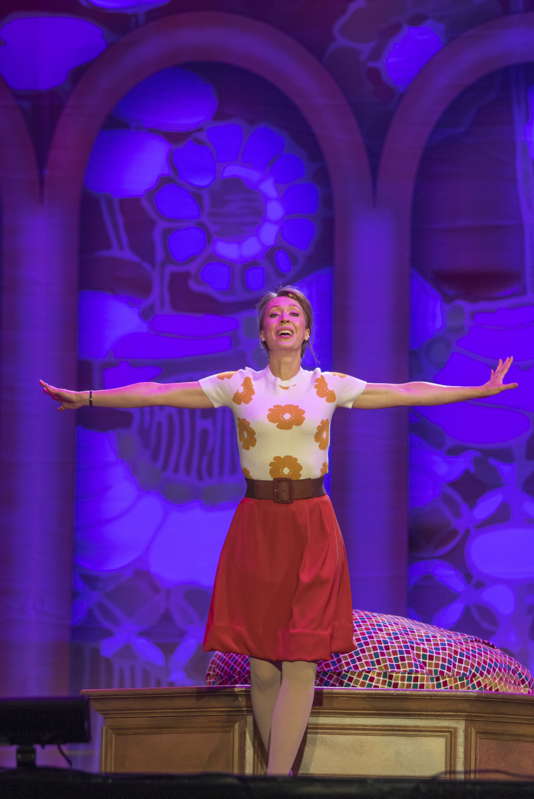
Emily Fons as Rosina. Photo © 2021 J Kat Woronowicz
Fons and conductor Bruce Stasyna worked out her decorations which pervaded her entire rendition. He also made the version of the score that we heard from the socially distanced, masked, and shielded players seen in a separate tent to on one side of the stage. His decorations were sufficient and dropped like honey on the ear. His tempi were never too fast for the singers while his dynamics gave shape and power to the score.
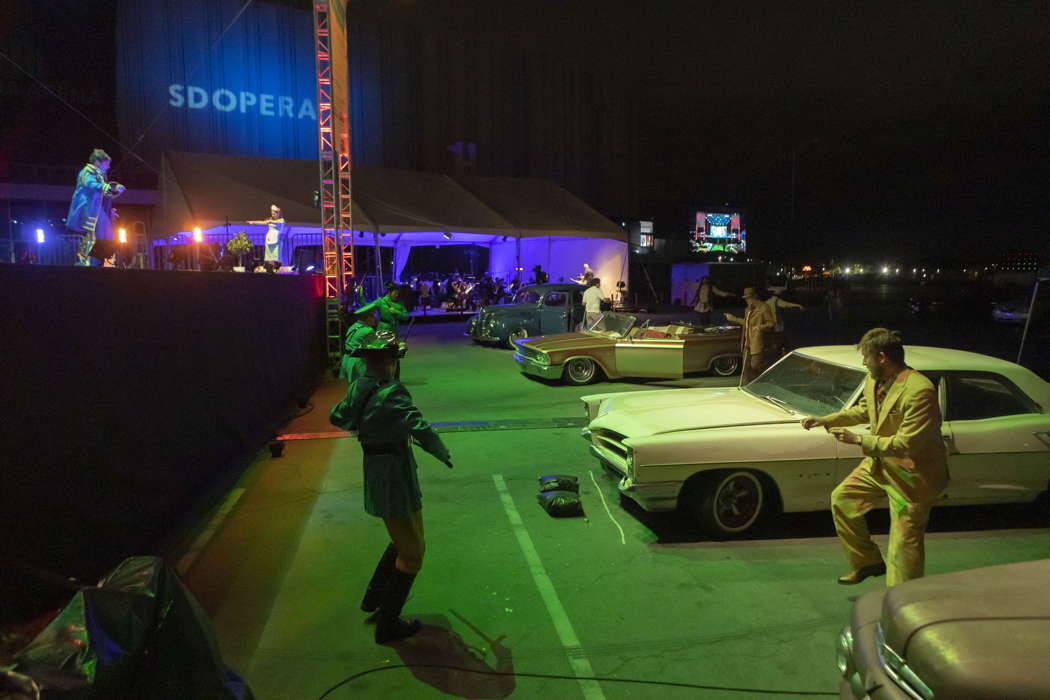
Members of San Diego Opera chorus in Pechanga Arena San Diego parking lot. At the back of the image is the tent containing the orchestra. Photo © 2021 J Kat Woronowicz
When Figaro suggested Almaviva pretend to be a drunken soldier who has been ordered to reside in Bartolo's home, Rosina tried a few tricks on her guardian. Bartolo, Met bass-baritone Patrick Carfizzi, then, in a patter aria that showed this singer's ability to pronounce fast without losing the beat or any of the words, told Rosina that she would have to be a very good liar to fool him.
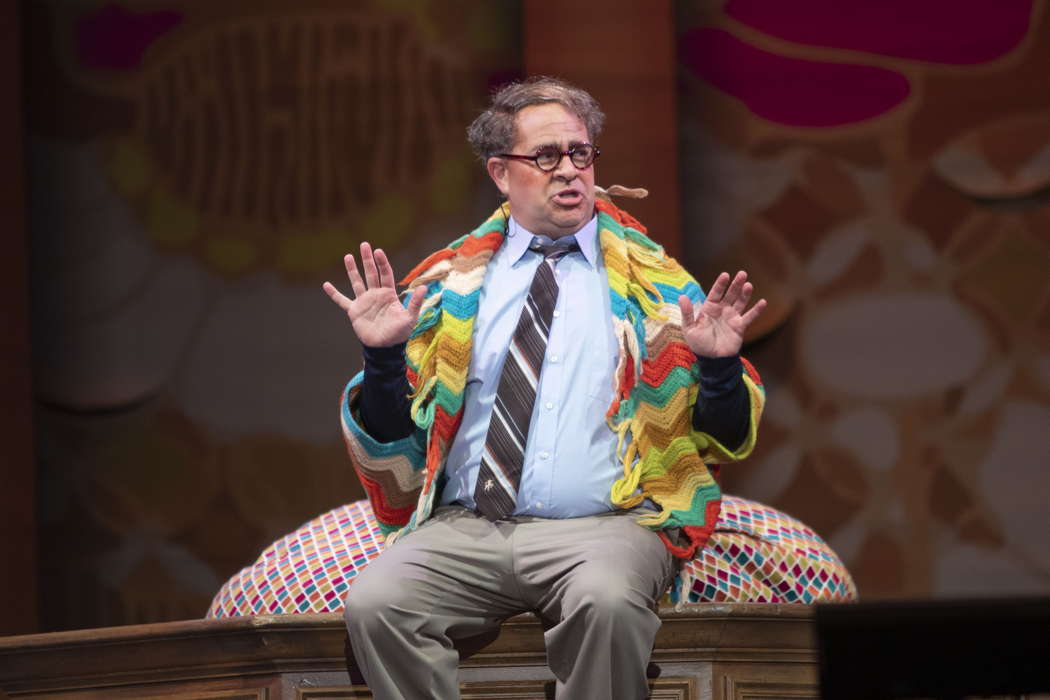
Patrick Carfizzi as Bartolo in The Barber of Seville. Photo © 2021 J Kat Woronowicz
Despite Bartolo's efforts, Rosina and Almaviva learned to love each other almost instantaneously while Figaro earned bonus money from the count.
Dr Bartolo had a friend and helper, too. Don Basilio suggested slandering those who would keep him from marrying Rosina. Bass Peixin Chen sang a robust, virile rendition of the aria 'La Calunnia' (Calumny) that was greeted with an ocean of honking.
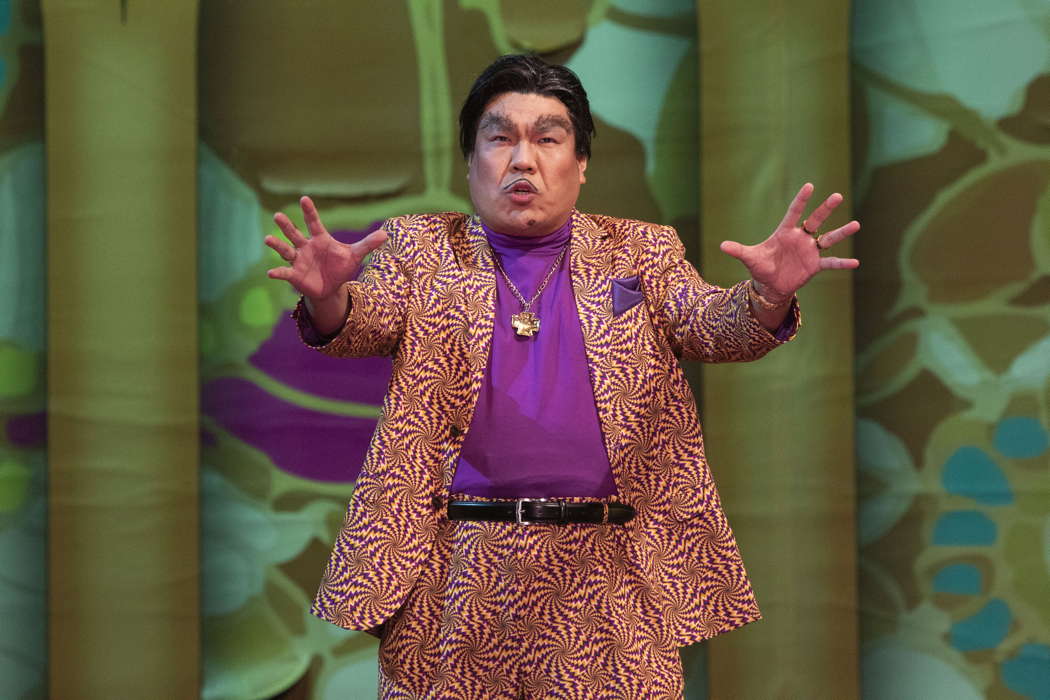
Peixin Chen as Basilio. Photo © 2021 J Kat Woronowicz
While the false music master taught Rosina, the real teacher, Don Basilio, entered and caused Almaviva to do some fast verbal dancing that explained his presence. Santelli, a good actor, seemed truly flustered.
Figaro, who arrived to shave Bartolo, found a gate key so Almaviva and Rosina plan to elope before Bartolo can force the young woman to marry him. Rosina began to wonder who Almaviva really was, however. Bartolo told her he was a procurer for a lecherous count. Here, in the score, there is a long and incredibly difficult aria that had to be omitted because of the time limit.
As Berta, Alexandra Rodrick did not get to sing her aria, but she proved to be an excellent comedian as did Joshua Arky as Fiorello and Michael Sokol as the Sergeant who was sometimes accompanied by an unseen male chorus. The Barber of Seville is a comedy and, like all its siblings, it ends happily with a young couple who will live and love happily ever after. Because of COVID, we could only have ninety minutes of live opera but that time was wonderful and will not easily to be forgotten.
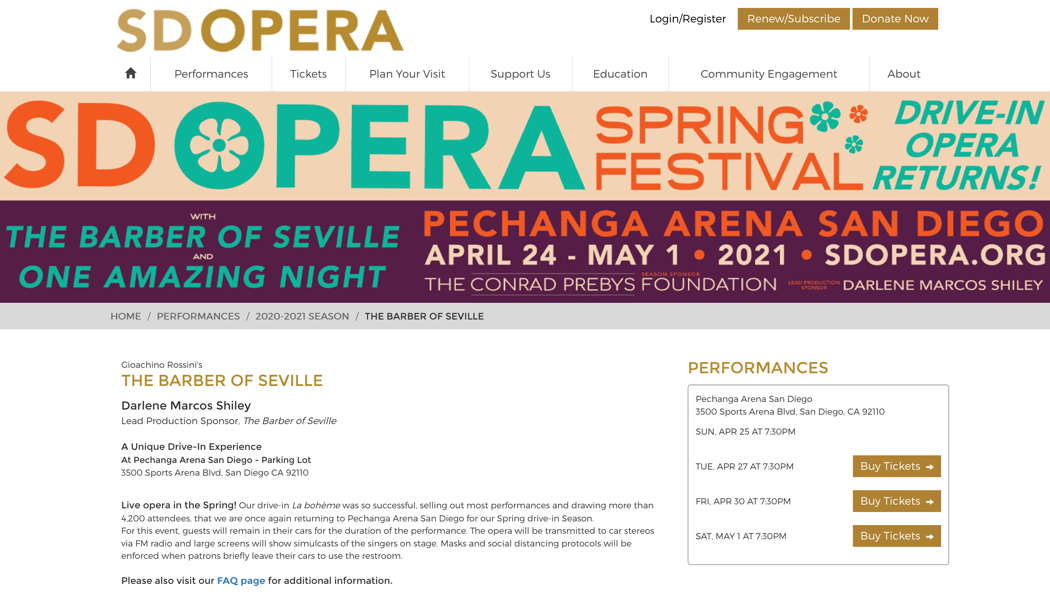
A screenshot from San Diego Opera's website advertising Rossini's The Barber of Seville
The Barber of Seville can be seen live on 27, 30 April and 1 May 2021 at the Pechanga Sports Arena Parking Lot in San Diego.
Copyright © 27 April 2021
Maria Nockin,
Arizona USA

MORE ARTICLES ABOUT 'THE BARBER OF SEVILLE'


